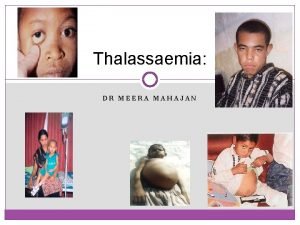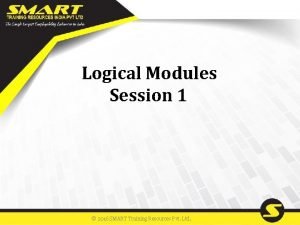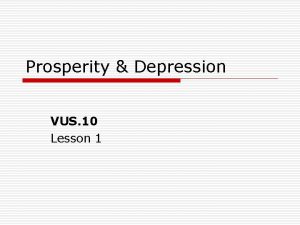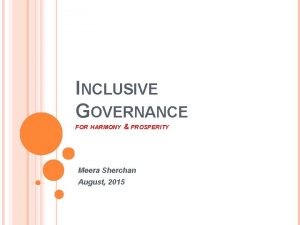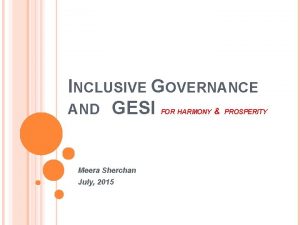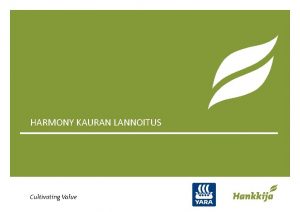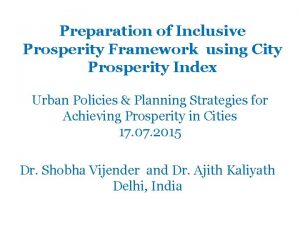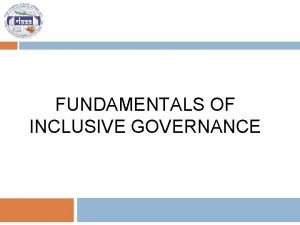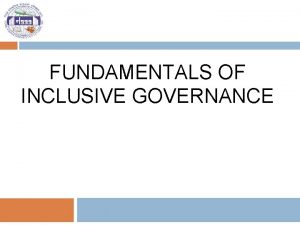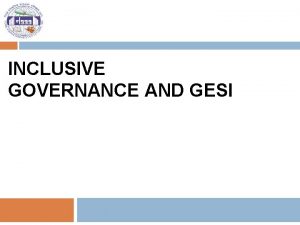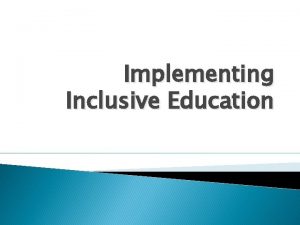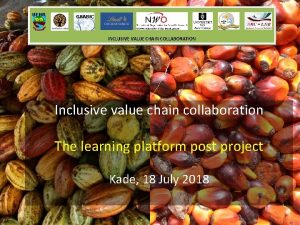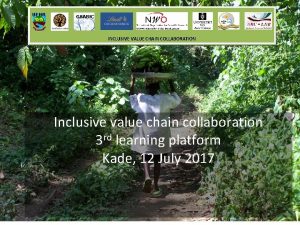INCLUSIVE GOVERNANCE FOR HARMONY PROSPERITY Meera Sherchan August
















- Slides: 16

INCLUSIVE GOVERNANCE FOR HARMONY & PROSPERITY Meera Sherchan August, 2015

PRESENTATION OUTLINE Need for IG in Nepal IG/Its components ARI relationships in service delivery ARI development in Nepal Public servant-service delivery Example of inclusive governance in service delivery (ARI/GESI being strengthened)

GROUP ACTIVITY: CASE Exploring Service Delivery: key issues and Need for Inclusive governance

LEARNING POINT Service delivery centre (school, waste management, electricity authority, health post & concerned department/ ministries) is neither held accountable nor responsible Lacking coordination Unobligated/ unethical/ unresponsive personnel Violation of human rights ( education, health basic need) Lack of discipline (violation of citizen charter) Absence of legal action High chances for the repetition of same mistake Poor health due to unresponsive governance Livelihood problem

WHY INCLUSIVE GOVERNANCE MATTERS IN NEPAL Limited implementation of public policies Negligence of legal frame work Limited coordination No access to information about resource allocation, rights and public services Limited inclusion of women poor and excluded Political influence over the resources Lacking ARI (accountability/responsiveness/integrity) Lack of trust in police and justice system

INCLUSIVE GOVERNANCE (IG) Enabling governance that not only aware/responsive to need/interest of WPEs but also willing/able to provide effective remedies to their concerns source: Towards Inclusive Governance , UNDP IG is about reaching closer to people Approach to improve delivery of public services & empower marginalized group to demand services Non-IG is absence of policy, practices & institutional arrangements to mainstream WPEs in governance system

KEY COMPONENTS (ARI+GESI) Four Interconnected Concepts of IG Accountability Responsiveness Integrity and Ethics Gender Equality and Social Inclusion

Responsiveness Accountability Integrity GESI

Accountability Being answerable for what is done: • Government organisations and public administrators accountable to citizens, users of public services and the law

Responsiveness Responding to the needs and aspirations of citizen and users of public services: • Government organisations and administrators respond to citizens and respect their rights

Government bodies and administrators act in ways that create public trust This entails: • Competence • Ethical standards • Consistency between what is said and done • Transparency Minimising the space for and opportunities for corruption Integrity

ARI RELATIONSHIPS IN SERVICE DELIVERY The State (source: World Bank 2004) Politicians Long route I Citizens / Clients Advantaged Excluded Short route Client power Services ct pa m Co Voic e Policy makers Providers Organisations Frontline providers

ARI DEVELOPMENTS INNEPAL RTI legislation Public & social audits required CIAA legislation Minimum conditions for DDC block grants Good Governance Act Civil service code of conduct

ROLE OF PUBLIC SERVANTS TO PROMOTE IG IN NEPAL Implementation of policies Simplifying the procedure Preventing injustice against WPEs Provide right information Participatory plan/program/Feed back Rational judgment WPEs friendly policies/infrastructure

CIVIL SERVANT & SERVICE DELIVERY Supporting factors: Challenges: National commitment through constitution, policies & legal framework Awareness towards IG & public demand Increased roles of donors Improved institutional arrangement Capacity of service providders Weak legal enforcement and compliance Attitude and behaviour of service provider Lengthy process and formalities Inadequate institutional facilities Resistance to change

CONCLUSION Inclusive Governance For : Harmony, Peace, prosperity & justice Efficient public service Better governance
 Iron is a constituent of
Iron is a constituent of Meera mahajan
Meera mahajan Meera gill
Meera gill Meera sood
Meera sood Chargaff rule definition
Chargaff rule definition Meera bai poems
Meera bai poems Meera kaur
Meera kaur Carbohydrate
Carbohydrate Meera warrier
Meera warrier Meera warrier
Meera warrier Meera venkatesh
Meera venkatesh Aakash saw his sister's son's maternal aunts
Aakash saw his sister's son's maternal aunts The growth of industrial prosperity
The growth of industrial prosperity Civil rights act of 1957 apush
Civil rights act of 1957 apush Buy life
Buy life Prosperity and depression worksheet answers
Prosperity and depression worksheet answers Prosperity deals
Prosperity deals

